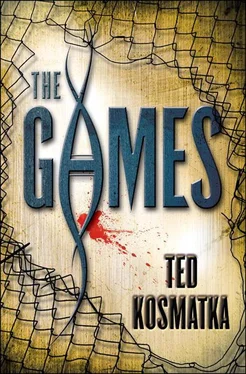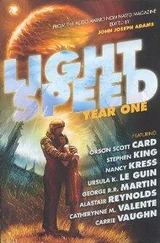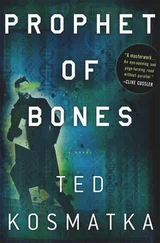Looking down, he took no pride in this creation. There was only apprehension. He would see the project through this last contest, but after that, he would find an island somewhere and retire. He’d find a place in the sun where he’d let his skin go dark brown, breed border collies the old-fashioned way—no petri dishes—and then give the puppies away to the neighbor children. This practice would probably make him less than popular with the local parents, but he wouldn’t care. It was a nice fantasy. He glanced over at the message on the vid-screen:
Brannin Computer
Online 1300 hours
Questions presented via code 34-trb
Evan Chandler’s office
Tomorrow’s the big day
Yup—yup—yup
Benjamin
He’d already read Ben’s interoffice memo three times. Most of the questions had been formulated and coded within twelve hours of the organism’s birth. So many questions.
Maybe we’ll get some answers , Silas thought. Maybe we’ll know for sure .
The old, well-worn fear resurfaced. He took out a small notebook and glanced at the list of things to check into, look up, double-check, order, verify, replace, and beg the commission to provide. Then he sighed. He wrote a new entry, a single word, and circled it.
All those long years of study. All the discovery. For what? He closed the notebook and slipped it inside the pocket of his lab coat. He supposed his interest in genetics had begun as a way to feel connected to a man whom he’d never really had a chance to know. But now, standing in a lab and looking down at the strange creation before him with no past and no future, his father never felt further away.
The Brannin Institute was a single five-story glass-and-stone building nestled within an elaborate arrangement of low artificial hills. It was sixteen acres of some of the greenest, most expensive parkland in the world, an island of exquisiteness in the rising urbanized tide that was Southern California. A new supply of leafy climax growth was shipped in on special trucks every three or four years to keep up appearances. The trees were deciduous, mostly, drought-adapted and selected for hardiness, but for all their size and tenacity, they tended to choke and sputter out one by one in the hot, tainted air of Southern Cali.
The Brannin Institute’s single small parking lot—usually nearly empty—today was filled to capacity.
News that the Brannin was going online again was cause enough for media interest. But a tip that Silas Williams and Stephen Baskov were also going to be present gave the story a whole new level of juice—enough to draw reporters across the country on red-eye flights from places as far away as New York, Chicago, and Miami. They set their equipment up along the cement walkways in the hopes of shouting a question interesting enough to get someone to stop and answer. Rumors were flying. Long limousines and short, snappy sports cars were squeezed between official-looking sedans and news personnel minibuses.
No one seemed to know for sure why the computer was being brought back online. But they knew the cost, and they knew who was attending, and because of that, they knew it was important.
EVAN CHANDLER sauntered into the chamber. He glanced at the long row of digilog drives that squatted along the wall of the anteroom. Real-space technology seemed so archaic to him now; and as he watched a group of clean techs busily assembling the interface, he couldn’t help but feel a little sorry for them. So much, after all, was lost in the translation. There was so much they could never experience on this side of the boundary.
Above him, the scrubbers hummed the air clean of particulate from behind vents evenly spaced across the broad acoustical ceiling. VR laser-optics were notoriously susceptible to dust contamination. It was another thing Evan loved about being in V-space: the only contamination was what you brought inside your head.
A large view screen stood in the center of the room before an audience of empty folding chairs. It’s where they would watch him, where they would see what he would see. Or so they thought. He smiled to himself. Evan had a secret.
The drivers were downloading some thirty-six million kilobytes of queries into the plug booth’s data streamers. It was part of how the three precious minutes were being paid for. Corporations, economists, researchers—they all had their questions, and all had paid for the opportunity to use a fraction of the Brannin.
But those questions meant nothing to Evan. Their software would talk directly to his V-ware without ever manifesting the slightest visual cue. He had simply to concern himself with opening the computer’s memory caches and activating the deduction systems. He hadn’t bothered to tell them they were giving him two minutes and fifty-nine seconds more than he needed. Things moved much faster inside, after all.
He pulled a supersized bag of M&M’s from his pocket, looked around to see if anyone was watching, then reluctantly put it back. Too many eyes. They would raise hell if they caught him eating anything in a clean chamber. His stomach ached. He cast his eyes around for Baskov. The old SOB thought he knew every damned thing. But he didn’t. He didn’t know shit.
BASKOV WAS at the back of the room, talking to a tall, lean man in a corporate suit. The man’s introduction was conspicuous for its absence, and Evan certainly noticed how politely everyone treated him. They gave him a wide berth. Even Baskov seemed a little uncomfortable around him. Evan was happy to see the old gimp squirm a little. Served him right.
His stomach turned again. To hell with them . He walked over to one of the drives and turned his back to the technicians, pretending to inspect the cables. With a glance over his shoulder, he quickly opened the bag of candy and stuffed half the M&M’s into his mouth. His head bobbed up and down in quick jerking motions.
A woman in a dark gray jumper approached. “It’s time, Dr. Chandler,” she said. She had the kind of mouth that showed lots of teeth when she talked, and he noticed how straight and white they were. He liked teeth, and a lot of people around here seemed to have really good ones. He thought about asking her if they were hers or veneers, but if he spoke, she might smell the peanuts, so instead he pressed his lips together and followed her.
It didn’t take long to attach the probes and strap him into the booth. The cloth pinched a little at his crotch, but by shifting his weight, it was tolerable. The nice-teeth woman in the jumper lowered the faceplate, and his vision lost its reds. He caught Baskov’s critical eye in the crowd just before the visor opaqued. Well, to hell with him; he wasn’t going to ruin Evan’s day. The old gimp could glare all he wanted, but Evan would still have his two minutes and fifty-nine seconds. Almost an eternity .
FROM SOMEWHERE a buzzer sounded briefly. Then the noise from the crowded anteroom began to fade, as if he were receding from it.
Silence.
Silence.
Silence.
Chandler opened his eyes to whiteness.
A flash like a snapped photograph, like lightning, like quick death, and then he saw it: a long, empty corridor. The corridor’s edges were broken only by a gathering of switches protruding from the wall in the distance. He walked. It was the ultimate clean room. No dust in here , he thought. He moved quickly to start the programs, curling his fingers around the switches and throwing them one by one as he came to them. Each switch activated a different part of the computer, waking it up in bits and pieces. He could hear the thrumming of the drives now.
Evan paused at the final switch, the one Baskov didn’t know about. This switch was very, very small, little more than a tiny white toggle, actually. No, it was smaller than that even. The more you looked at it, the smaller it got, receding from your inspection—an interesting sort of camouflage he’d developed. He squinted, feeling for what was barely there, and then he flicked it. The lights went out.
Читать дальше












